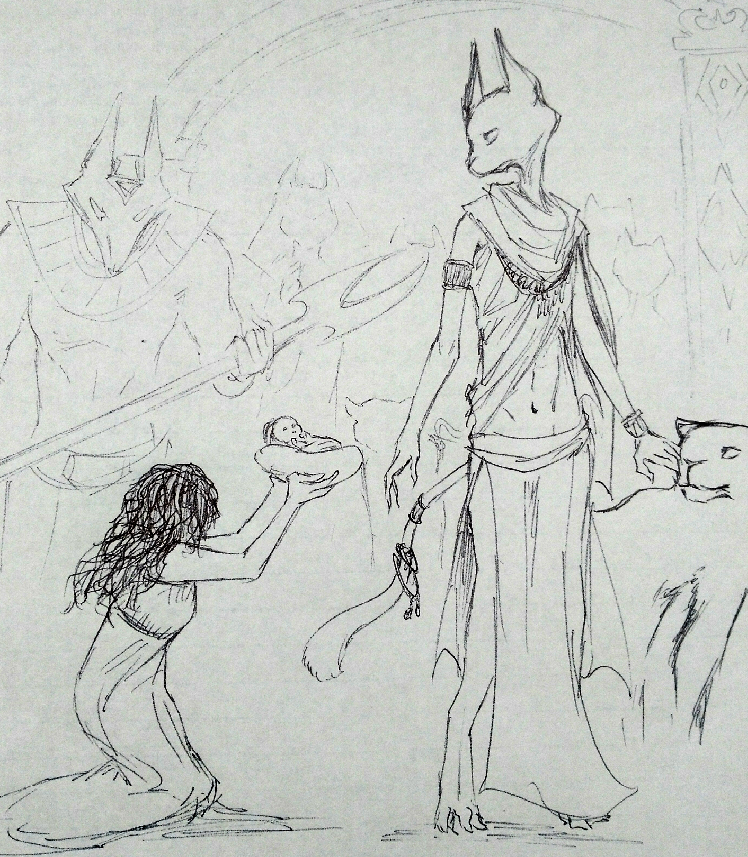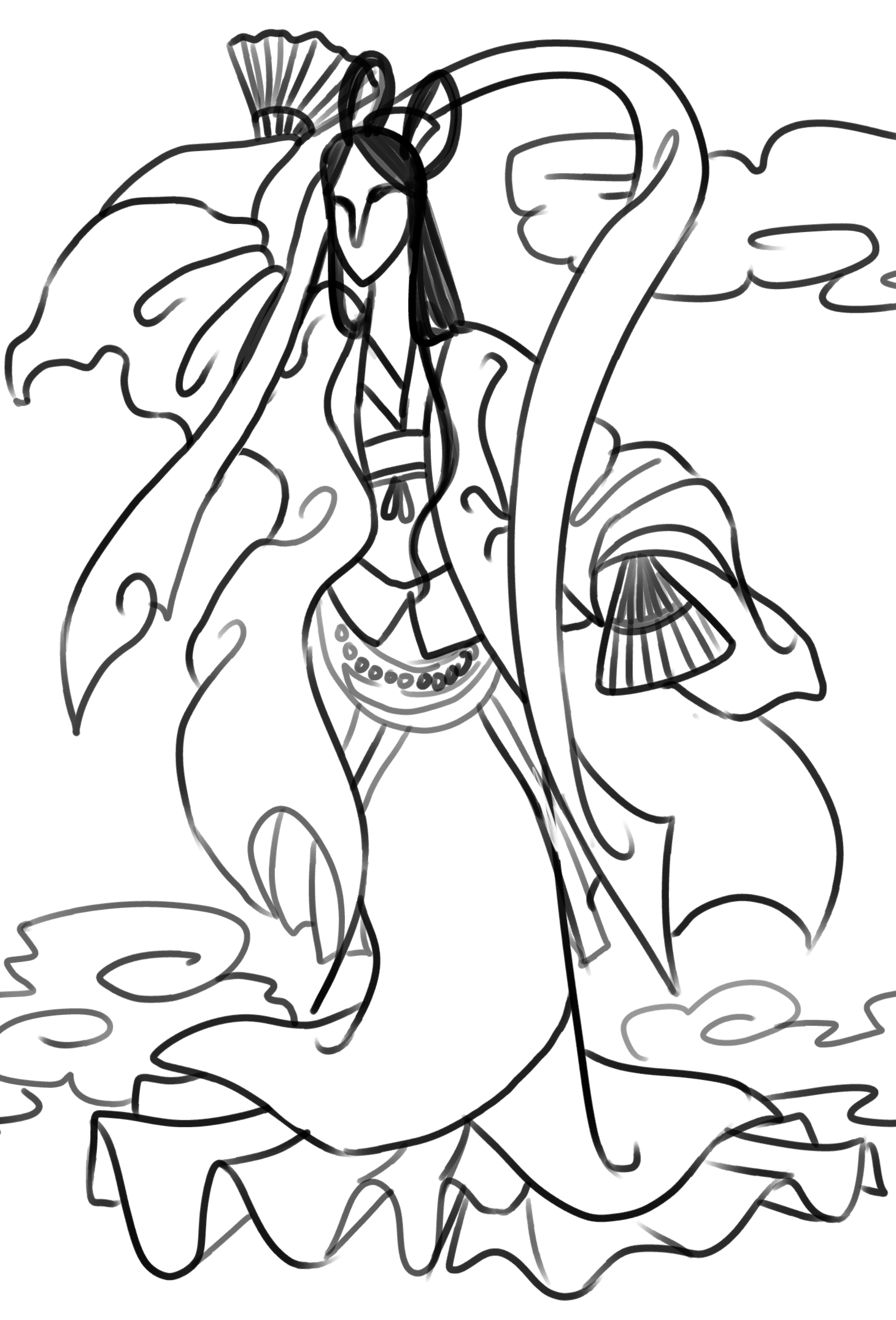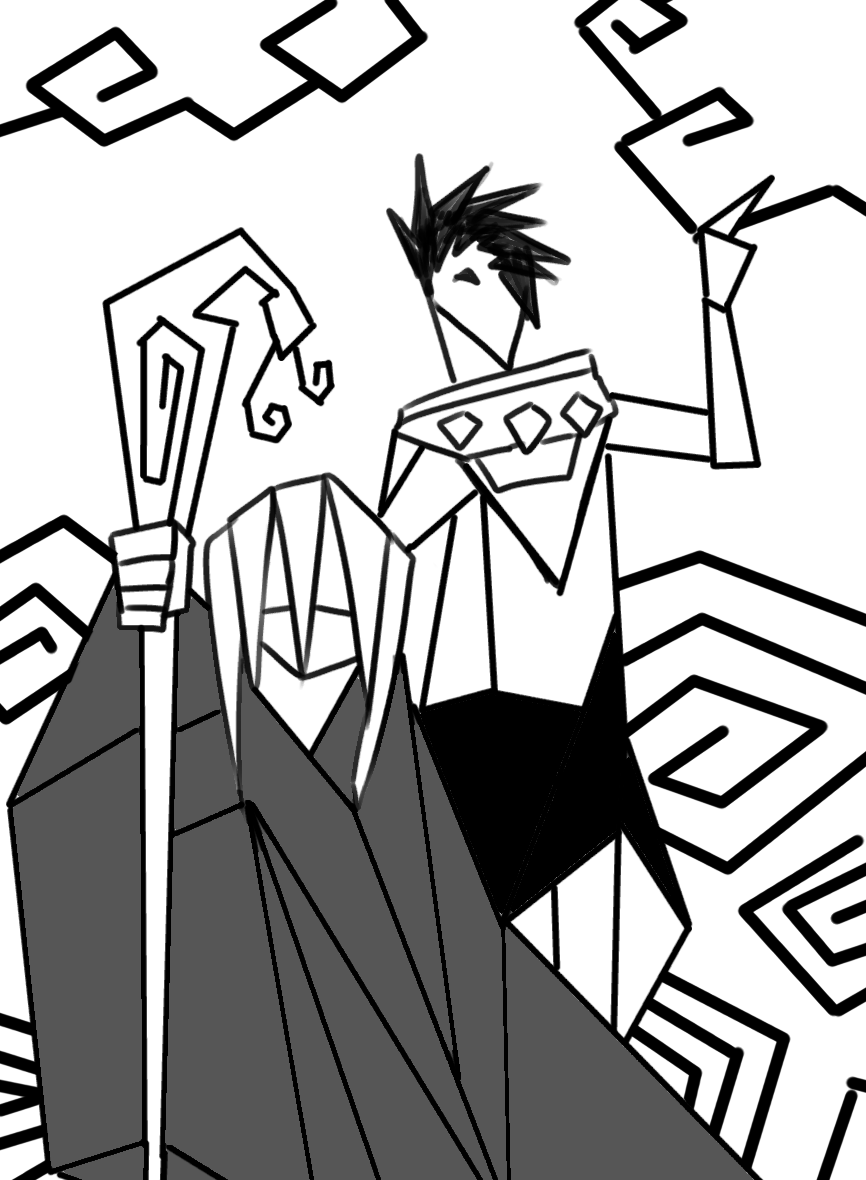Literature and Lore (Shard Ne'Vaal Supplement)
| “ | You ask how I survive this mad world... Well, even if my mind will be devoured into nothingness, at least I know I'll taste delectable after having filled my head with so many books. | ” |
| —Rufus, head librarian | ||
Literature[edit]
Shard Ne'Vaal had lost many of its greatest works of literature and art to the Gorge. However, some were too popular to be lost entirely, and were recreated. Others were rewritten with some liberties taken. You will find a big difference between New and Old World literature is that the new one is obviously more dark and dreary.
Old World Literature[edit]
- Collective Works of F.H. Momento
The author F.H. Momento was a mysterious man who suffered from chronic illness most of his life, and lived somewhere in Preius (modern day Ytel shard). He was confined to his elite circles where his esoteric attitude isolated him. To pass the time, he wrote numerous short stories to pass the time. His works were poorly received at first, but he was posthumously regarded as one of the greatest writers in the kingdom. This tome was saved as libraries around the world crumbled. Its contents have been reproduced in small amounts. The stories are of the fictional genre and largely revolve about themes of mortality, death, and loneliness. Listed below are a few example stories:
- The Wight Woman: A tale about a woman who wakes up and goes about her daily life for a day, but ends up murdering an associate of her husbands', who she believed had been sleeping with him. When the local watch comes to apprehend her, they find her husband's decayed corpse in her house, as well as the murder weapon, and the outline of where another body should have been next to him. There is a noise behind them. The tale ends with the watchman's bodies being found the next day in the house, the woman missing still.
- Dead Man's Chest: This story is believed to have stemmed from Momento's critique of the lower class, who he viewed as a no-good breeding ground for thugs and thieves. A trio of men go to invade the mausoleum of a rich man, only to find his ornate coffin in there. They open it, curious for riches, to discover the corpse of the nobleman, whose chest has been ripped out. They then hear a mysterious dark laughter, which prompts them to leave. A dark force then stalks the three of them afterward, and each man is eventually found dead with their chests torn open.
- The Voyage
This classic story was written by Kyrie Danelev Sky, detailing the odyssey of a ship named the Dawnbreaker, from the point of view of the first mate, Roilan. Through the course of the voyage, it is implied that the motions of the boat are constantly making the men of the ship ill as they go on their longest voyage yet in pursuit of a sea monster nicknamed Ruth. Eventually, Roilan starts breaking down after being at sea for so long that he hallucinates a good portion of the book, seeing the boat insides twist and turn and monsters emerge from the floorboards. During a horrific storm, Roilan pleads his captain to turn back. The captain refuses, and Roilan screams after seeing his face before a tidal wave destroys the vessel, and a monstrous growl is heard. When Roilan awakes on a beach, he finds the wreckage of the boat is no longer the ship he recognizes, but a twisted and warped form like that from his delusions. The book ends with him questioning whether Ruth was the one responsible for the storm.
- The Basics of Nature Series
This is the collection of analytical tomes detailing the nature of the sciences, math, and of course how magic factors into them. They are almost all exclusively written and published by the Scholars of Wranid. For a while, there was some controversy and warring with other scholar groups who wanted to have a say. There are about 3066 volumes in the series in total, though it was never announced they finished. The first book in the series is believed to have been published during the Age of Kings. The last one is dated towards the end of the False Dawn. When the event of the Gorge occurred, a good deal of the series was lost, and by then, most of the scholar circles had collapsed due to the corruption in their institutions. An example of one of the volumes is provided below:
- Principia Physica: This thick addition to the series details the ideas of gravity and basic physics in the world. It is believed that the god who gave up their body to create the world still has a shred of animus left, which creates the attraction of everything onto its surface. In the same way, it tethered the sun to itself as well as the three moons, unwilling to let go even in death. This is supported by the use of magic like graviomancy, which is believed to originate from this attraction. There are also simple devices listed in the book, like levers and pulleys and how they work, as well as thermal sciences using fire magic and such.
- The Craft of Battle
A classic Ba Xin anthology collects anecdotes from legendary generals of the past and puts their strategic wisdom into advice for normal life. The original compiler was believed to be Gen Wu, a famous tactician of the Warring Kingdoms era, when Ba Xin was divided into five kingdoms.
- Librium Philosophus Series
Written by the collective circle of the Mindful Eye scholars, this series is composed of 65 volumes dedicated to detailing dialectics of thoughts and ideas through time. These are incredibly boring topics as any can guess, from epistemology to existentialism and more. The scholars were dedicated to dialogue and Socratic discussion, which is the format that these books are written in. They are dense and incredibly tedious for regular, uncaring folk to read. Most who have it on their shelves keep it for show. An example of a volume is provided below:
- On the Existence of Knowing:
It is difficult to say how one knows they are thinking when they do not even know if they are "they."
The book starts with this line from scholar Frampt Usselton and continues for about 443 pages about how the existence of thought might be able to be rationally proven. However, he also is joined by an opponent, scholar Iorik Orgol, who argues that knowledge can only be affirmed with the combination of logic and empirical data to prove reality is real. Otherwise, all knowledge of reality would be useless. - The Epic of Fire and Ice
There is few a soul in the world who had not heard a fragment or rendition of the epics of Ignis and Cyril. It is believed this tale originates from the Eden Period, originally in the form of oral storytelling, until it was put on paper around the Age of Kings to the credit of the bard Firel Khinjeris. The story is believed to surface in multiple cultures around the world, with many tellings. But the plot remains roughly the same. There was a majestic birth of twins, who grew up to be Ignis and Cyril. Their bitter sibling rivalry ended up with their expulsion from their household, and their resentment pushes them through a series of epic adventures. There is a large number of tales about these, and possibly many more which never made it to writing. There are multiple endings to the story, depending on who is telling it:
- In a Ba Xin telling, they both fought in a final battle until near death and the gods themselves had to come intervene so the world would not be destroyed. Ignis ended up being turned into a cloud and Cyril into a rock. Because the sky and earth were ever apart, they would never meet again. Eventually, Ignis began to feel for the loss of his twin and grieved, which is why it rains, as those are his tears.
- The official ending in Preius is that the two brothers met one last time as old men and set aside their differences, with their armies amassed in the background. They forgave each other and went back home to die peacefully.
- Perhaps the most violent of these endings is found in Ferbesch, where the two brother's final battle ended up splitting the earth. They both fell into the chasm, struggling forevermore. And it is said that is why earthquakes happen, as they are still fighting so raucously out of sight.
- Alchemyst Epics
Written by famed alchemist Fayn Uyurin, the book details his exploration of the power of alchemy. It reads very much like a story of fiction, and details the 30 years of his allegedly most influential times, including names like alchemist Aljahth Martho and Redna Erisk. The field of alchemy was greatly advanced and paved the way for even laymen to eventually gain arcane understanding, creating new areas of expertise like the alchemists.
New World Literature[edit]
- Tales from the Sordid Bard
Manafort Gegenlicht was a famous actor and playwright who had a normal youth. Many of his stories became performances meant for children. He survived the Gorge, but the event left him ultimately blinded. His demeanor changed almost immediately, and he was thought to be mad and broken by many. Supposedly, he had a near-fatal fever and woke up, cured and suddenly no longer raving mad. He tore up almost everything he had written prior and hired scribes to take down new tales that he claimed came to his blinded mind amid his fever. These are essentially new versions of his old works, with many a dark twist:
- The Dvati: This is the new version of his original fairy tale, "Hans and Gerda", in which two siblings get lost in the woods and find treasure in an abandoned hag's lair. In this rewrite, the two siblings seem on the verge of starving to death after wandering lost for hours. They decide to eat each other so they can always be together. A huntsman the next day happens upon a single body of a child, who had chewed off its own arm and leg.
- Leberwurst: Manafort's original fairy tale of a girl who finds love at a ball is changed into a rather grotesque story of how she ends up cutting out the livers of hung men as an offering to a dark fairy, who makes her the most desirable woman for a night. When the magic wears off, a witch hunt ensues and she finds herself hung in the same gallows as that of the men which she dissected.
- B'Kirth's Wandering Almanac
Some survival guide written under the pseudonym B'Kirth. It is styled as an autobiography but reads almost like a satire of the current state of the world. A lot of the "survival tips" within are more like jokes or pranks.
- Details of the Old World
This short book is considered a commoner's guide to the world before Shard Ne'Vaal. It is not very long nor difficult, making it perfect for children. It covers the history in brief snapshots without being too detailed like most historical codices. It is said to have been compiled by a nomadic chronicler with an immortal body.
- Bedtime Stories
A variety of short fable-fairy tale stories are encompassed into this handy parenting tool for kids who won't go to sleep unless you tell them something.
- The Thumbless Boy: "There once was a boy who liked to suck his thumbs. His mother told him not to, but he wouldn't listen. So, she cut off his thumbs. He is now thumbless." Lesson learned, listen to your parents or you might lose your thumbs.
- The Elexia Star Charts
Written by the grumpy and hermitic artificer, Helbairn Redheart, the Elexia Star Chart is a fictional series utilizing extensive arcane knowledge to craft a very realistic and simulationist retelling of the creation of a galaxy and worlds within it, without creator gods. The titular Elexia are a fictional race of creatures that have traveled the stars and made extensive maps. Their advanced knowledge and technology renders them de facto gods of the galaxy. This series spans 18 volumes of current. It is fairly obscure due to its density and jargon. The style of this story spans arcs surrounding a singular planet of elf-like creatures who plan to oppose the Elexia. While they grow in power, they are ultimately merely playthings in the eyes of the galaxy gods, who relieve their boredom by orchestrating defeats and victories in the battle with the elves. Even with their longevity, the elves cannot understand the greater expanse of their opponent's reach. In more intellectual circles, scholars believe this series highlights the insignificance of mortals in the greater scheme of divinity and say it is emblematic of Helbairn's fatalism.
Lore and Legend[edit]
Myth is a story and does not have to mean it is false. Rather, it could be an interpretation of an event, being a personal myth. The way this goes about creates lore which people record as their own, and legends which surface from it. They are not mere fairy tales. Whether they are entirely accurate is another story. Perhaps you can see some parallels if you check out the history section.
- Moon Hare
It is said the sky is made of innumerable creatures at night, whose shadow is what blocks out the sun. Among all of these animals, Yue only favors the rabbit, and that is why she will let it close to her territory on the moon. The beginning phase of the moon's wane starts with a shadow that seems to resemble two bunny ears, because that is when Yue invites the hare to her abode. For the course of the waning moon, she enjoys his company. Then the moon waxes when he takes his leave.
Epics of the Elements[edit]
Stories with motifs of the Elemental Planes are compiled most famously here. The primary books are Air, Water, Fire and Earth. The chapters following that involve the quasi-elements like Ice, Ash and Ooze. Various heroes of epic legend are listed in each book, coming from many races and backgrounds.
The Annals of Kahnam[edit]
See also Prophecies
Kahnam was the pseudonym of a collective secret society in the Old World. Their writings were dismissed as heresy originally. However, their works have now become one of the most prominent in Shard Ne'Vaal. The annals are a collection of scrolls, most of which are lost post-Gorge. However, of the ones retrieved and analyzed, there is shocking evidence that this secret society, retroactively dubbed Sath'nul ("Void Tongue"), had possibly predicted the event of the Gorge and even written on how to repel and defeat Graghk itself! The authors, being the Sath'nul, are no longer in Shard Ne'Vaal collectively, though some members of their secret society may have sequestered themselves as hermits to live out the rest of their days in squalor. During the Old World, this society was no less invisible, often operating with esoteric symbols in very small and hidden places.
The Arts[edit]
Just as important as the books and legends are the artists who depicted them. They vary based on vision, but there is a shard of the artist's truth in each piece. In addition to visual arts like various paintings, there are songs which are attempts to catch the mood of the time. These are examples of what is present in the world, though you are free to add to them in your rendition of the campaign.
Pre-Gorge[edit]
- Songs
The Exploits ("Die Heldentaten") is a snippet of the Hocheim epic Das Wunderring, it is a part of a soliloquy sung by the general, a champion of Vatar, as he prepares to lead his troops into battle. It has roots as a battle cry used by the ancient warring tribes, used to invoke the power of the Sky Striker and curry favor with his court. Prior the death of Vatar, it was used in operas of the epic, and was considered a Hocheim anthem for some time. It is a bit confusing to translate sometimes because the god is addressed as Vatar, which is also the word for "father" in Hocheim.
|
|
|
- Poetry
There is a plethora of lyrical verses of the Old World, many of which were used in bardic epics as well as simple plays. As these did not require instruments or visual artistry to compose, poetry was one of the most popular and accessible forms of art. It was practiced by even lower classmen, particularly in the continent of Dasoon. In Toryu for example, they have a unique and simple form of poetry called the haiku, which counts syllables, usually in a 5-7-5 fashion. Translations into Common curiously can yield the same result, though some meaning may be lost in translation. This poetry commonly does not rhyme, and is simpler than a vignette in describing something in nature usually. This example of a haiku uses the Shou-Wa script instead of the phonetic Wa-an simplification. It is one of the most famous haikus, written by one of the great poetry masters of Toryu, Bashou.
|
|
|
|
Elsewhere in Dasoon, Ba Xin also has a very vibrant culture of poetry. Their very language makes use of things called "four-character sayings" which are shortened forms of entire poems. These function as terse idioms with their own humorous stories, usually, and are used in common speech to relay ideas otherwise too long-winded to elucidate. There are longer forms as well, for the more educated, but even the peasants knew a good handful of these poems. In Shou, they are called cheng yu, which means "formed speech." There are believed to be over 20,000 phrases in total, and this was a practice of linguistics which also is present in Jjan as well as Toryu culture. The example below means "to deliberately misrepresent."
Poetry in Hocheim is more like singing, as seen in "The Exploits." However, poetry across Bevel is extremely flowery and esoteric, woven with meaning in the forms of stanzas and verses, and are incredibly versatile. Some rhyme in limerick, while others are grand soliloquies. Provided is the example from Preius playwright, Lloyd Flow, who is known for his popularly humorous yet dark and nihilistic tragicomedies.
- Drawings
Post Gorge[edit]
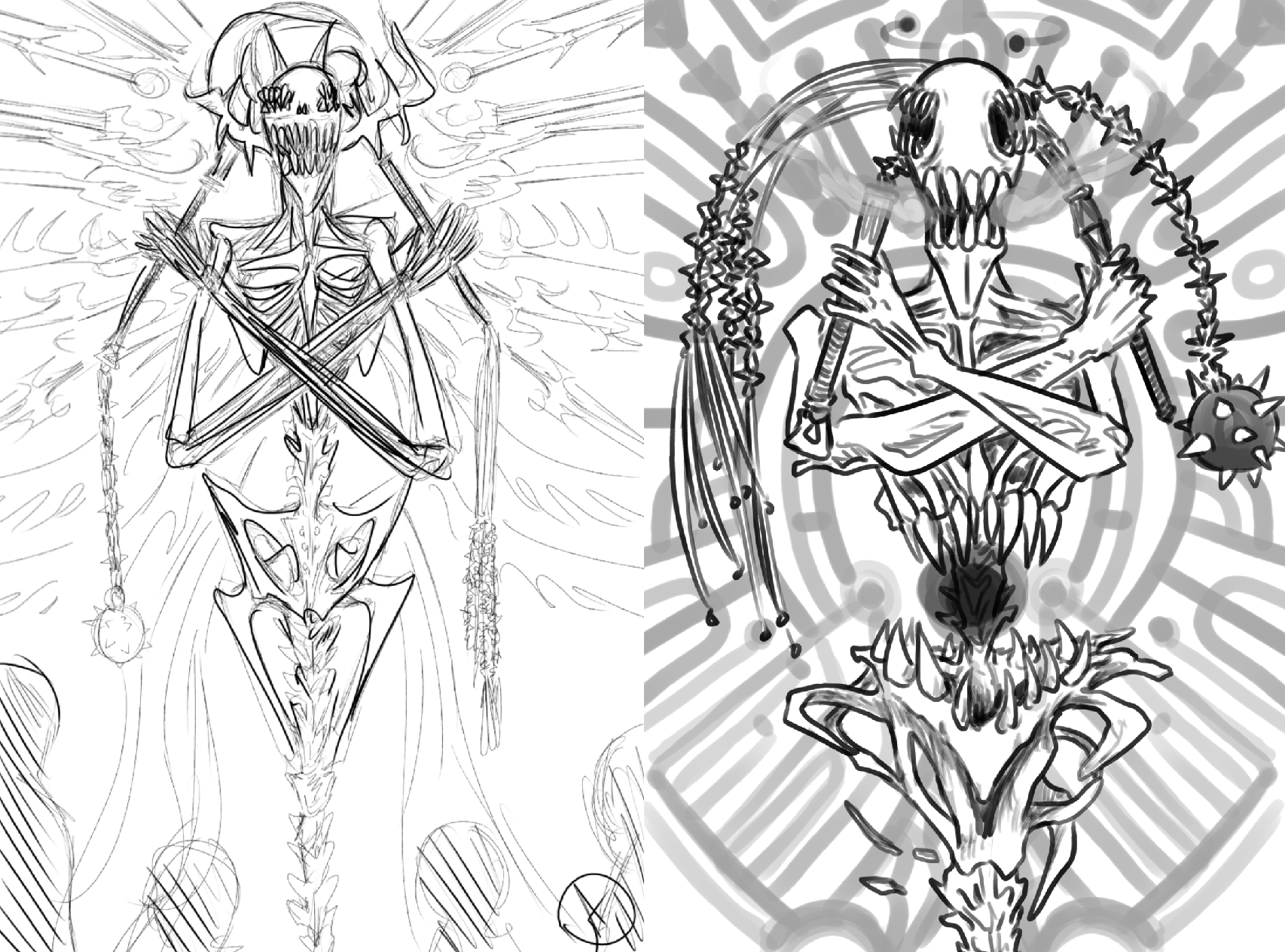
|
|---|
| "Majesty of Graghk" By Yanied. The piece is depicting one rendition of Graghk as seen almost angelic, and in such repose. It is a popular depiction among the void cults. In this depiction, Graghk seems to favor flail weapons. The left is the sketch before the final product on the right. |
| Shard Ne'Vaal Campaign Settingv | ||||||||
|---|---|---|---|---|---|---|---|---|
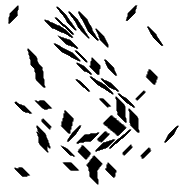
|
Players' Handbook | Races, Languages, Classes, Backgrounds, Themes, Magic, Psionics, Religion, Literature, Legends and Lore | ||||||
| Shard Ne'Vaal Crash Course | History, Geography, Climate, and the World, Bestiary, Flora, Factions, Calendar and Holidays, Cosmology and the Planes, Politics and Law | |||||||
| Dungeon Master's Guide | About, Items of Legend, Campaign Ideas, Consumables, Sample Places, NPCS, Variant Rules | |||||||
| ||||||||
Back to Main Page → 4e Homebrew → Campaign Settings → Shard Ne'Vaal
